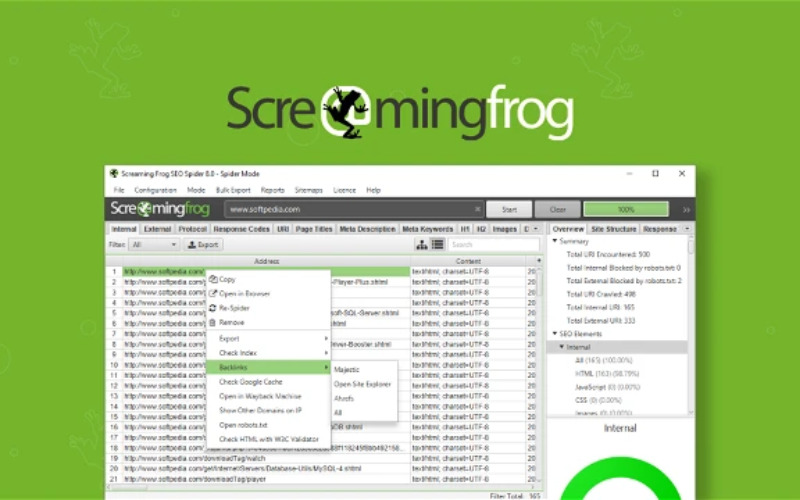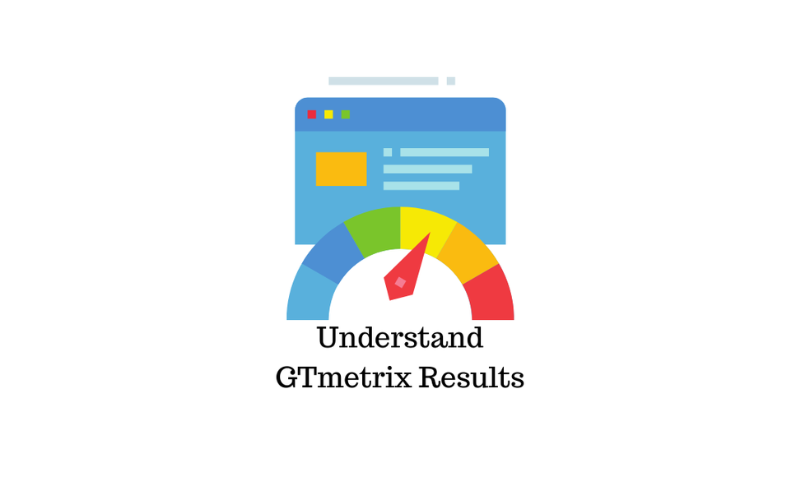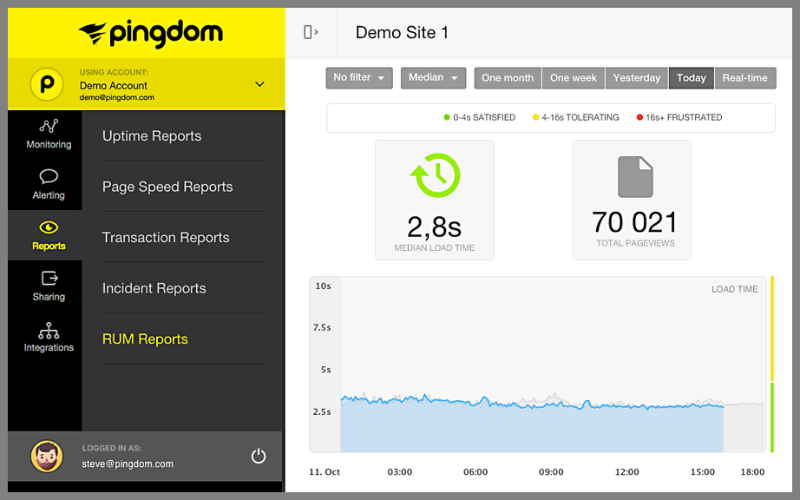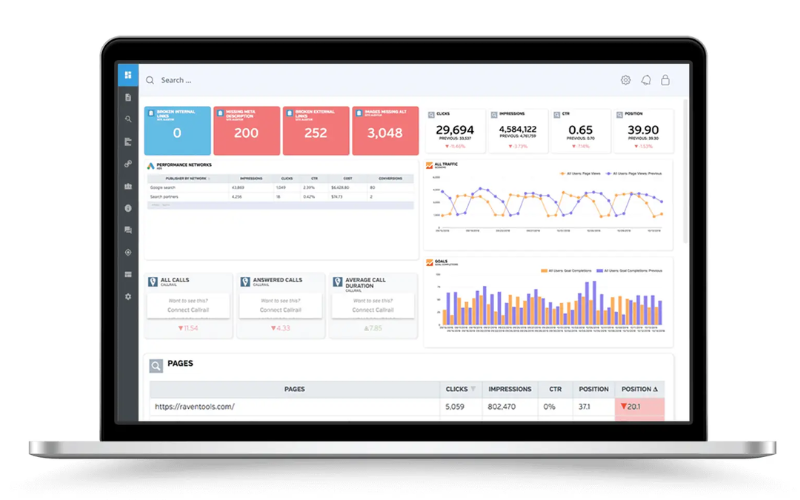SEO is the abbreviation for search engine optimization. Organic search engine results entail boosting a website’s quantity and quality of visits. To improve a website’s rating in Search Engine Results Pages (SERPs), optimization entails making it more appealing to users and search engines. The supreme goal of SEO is to improve a website’s exposure, traffic, and lead or sales output. Researching keywords, creating links, and crafting content are SEO methods. Some well-liked tools for search engine optimization are listed below:
1. Google Analytics
You may evaluate and track website traffic, consumer behaviour, and conversion rates using the free internet analytics tool Google Analytics. It offers valuable data on how users interact with websites, including which pages they visit and how long they stay there.

2. Google Search Console
A free tool to manage and track how a website appears in Google search results is Google Search Console. It offers data on click-throughs, search terms, rates, impressions, and other critical metrics that help the website appear more prominently in search engine results pages (SERPs).

3. Ahrefs
A paid SEO tool Ahrefs offers in-depth information on competition research, backlinks, and keywords. It is frequently used by SEO experts to monitor the effectiveness of their websites and to improve their link-building and content tactics. To assist you in optimising the content of your website for search engines, it provides keyword research tools and content analysis capabilities.

4. Semrush
Semrush is a comprehensive SEO tool that offers users to watch ranks, analyse keywords, examine rivals, spot on-page, and technical SEO issues. A site audit tool, backlink analysis, and keyword research tools are available.

5. Moz
Various tools are available in the Moz SEO software suite to enhance the performance and exposure of websites. On-page optimisation, site audits, keyword research, link building, and rank tracking are a few of its features.

6. Yoast Seo
Yoast Seo is a well-known WordPress plugin that offers ideas and tools for on-page optimisation to aid with website SEO. It has functions like keyword optimisation, metadata management, and readability analysis.

7. Screaming Frog
A website audit and SEO assessment may be performed using the website crawler Screaming Frog. Duplicate content, page titles, broken links, and other on-page SEO elements are found with this tool. You may create reports and export the information.

8. Google Keyword Planner
Keywords for a website found using the free Google Keyword Planner tool. You can see each level of competition, suggested bid, and keyword’s search volume. This knowledge may be put to find low-competition, high-volume keywords for websites.

9. Keyword Tool
A keyword research tool that might assist you in finding long-tail keywords appropriate for your website is called Keyword Tool. It contains information on search volume, competition, Cost-Per-Click (CPC), and other factors, as well as phrase recommendations from Google’s Autocomplete feature. It can assist with identifying keywords that are simpler to rank for and will bring more relevant visitors to your website.
10. Serpstat
Serpstat is a tool that offers in-depth information on the rankings of websites and organic search engine traffic. It enables users to optimise their websites by performing keyword research, backlink analysis, and opportunity detection on rivals’ websites.
11. Seoptimer
Seoptimer tool offers an SEO audit of a website and recommendations for improvements to boost its functionality. It examines mobile compatibility, website speed, usability, and on-page SEO.

12. Answerthepublic
By providing a list of questions and phrases people are looking for connected to a specific issue, the Answerthepublic tool aids users in finding pertinent keywords. This tool can assist companies in producing content that is more audience-relevant and targeted.
13. Ubersuggest
Ubersuggest aids in the discovery of backlinking possibilities, keywords, and article concepts. It offers recommendations for associated keywords, content concepts, and long-tail keywords that help with search engine optimisation. In addition to providing estimates of domain score and monthly organic traffic, it visualizes the top domains and pages for every search.

14. Google Pagespeed Insights
Google Pagespeed Insights tool measures the speed at which online pages load on laptops, personal computers, and mobile devices. It delivers a score for page speed based on various parameters and offers advice for improvement. This tool provides an in-depth analysis of other performance measures, including page load and rendering times.

15. Gtmetrix
A website performance measurement tool called Gtmetrix offers a thorough report on variables, including request count, load time, and page size. Additionally, it makes recommendations for enhancing the website’s speed and functionality, including browser caching, image optimisation, and minification of JavaScript and CSS files. 
16. Pingdom
Pingdom is a tool for measuring website speed that aids in performance analysis. With Pingdom, you can test the speed of your website from various places around the globe, find bottlenecks that are slowing it down, and get notifications when it goes down.

17. Mozbar
While you explore the web, Mozbar, a free browser plugin, gives you insightful SEO information. You can get crucial SEO indicators for any website with Mozbar, including domain and page authority, keyword difficulty, and on-page analysis.

18. Semrush Writing Assistant
A content optimisation tool called Semrush Writing Assistant aids in producing excellent, SEO-friendly material. You may check your material for readability, originality, and SEO optimisation with Semrush Writing Assistant and you’ll get recommendations on how to make it better. Hence, it ranks higher in search engine results pages.
19. Raven Tools
Users may manage and assess their internet marketing initiatives using the suite of SEO and marketing tools known as Raven Tools. Email marketing tools, keyword research, backlink analyser, site audit, competition analysis, and social media management are a few of its capabilities. The platform seeks to offer perceptions and data-driven approaches to aid companies in improving their internet presence and boosting organic traffic.
20. Grammarly
Grammarly is an AI-powered writing assistant that assists you in writing better by pointing out your style errors, spelling, punctuation, and grammar. It helps you with enhancing the impact and clarity of your work by providing ideas for fixing these errors. It is available as a browser plugin, a desktop application, and a mobile application.

























